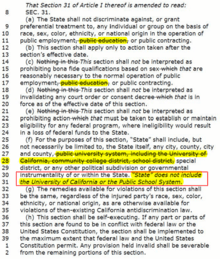Senate Constitutional Amendment No. 5
| Elections in California | ||||||||||
|---|---|---|---|---|---|---|---|---|---|---|
 | ||||||||||
|
||||||||||
|
||||||||||
The California Senate Constitutional Amendment No.5 (SCA-5) was introduced by California State Senator Edward Hernandez to the California State Senate on December 3, 2012.[1] This initiative would ask voters to consider eliminating California Proposition 209’s ban on the use of race, sex, color, ethnicity, or national origin in recruitment, admissions, and retention programs at California’ public universities and colleges. California Proposition 209 prohibits state government institutions from considering race, sex, or ethnicity, specifically in the areas of public employment, public contracting, and public education. SCA-5 was passed in the California Senate on Jan. 30, 2014.[2] On March 17, 2014, Assembly Speaker John Pérez referred the measure back to the Senate. In a joint statement with Senator Hernandez, the Speaker announced the creation of a bicameral commission on issues surrounding recruitment, admissions, and retention in California’s systems of higher education. Senate President pro Tempore Darrell Steinberg also issued a statement stating that he is a supporter of SCA 5: "I look forward to working with Senator Hernandez, my Senate colleagues, and the Assembly in bringing all communities together for a serious and sober examination of Affirmative Action.”[3]
Content of SCA 5

SCA-5 essentially does the following two things:
- Deletes the specific provisions implemented through the enactment of Proposition 209 that prohibit the State from discriminating against, or granting preferential treatment to individuals or groups on the basis of race, sex, ethnicity, or national origin, in the operation of public education.
- Deletes the UC and the public school system from the definition of the “state” under Section 31 of Article 1, thereby repealing the application of the provisions of Proposition 209 to those entities.
Support
The lead author of the bill, Senator Hernandez, argues that due to Proposition 209, "there has been a precipitous drop in the percentage of Latino, African American, and Native American students at California public universities, despite the fact that those same groups have seen steady increases in their percentages of college-eligible high school graduates."[4]
The same arguments for support are summarized as follows in the bill analysis:[5]
"According to the author’s office, immediately following the November 1996 passage of Proposition 209, there was a significant drop in the percentage of enrolled minority students at both the UC and the CSU. The author’s office is concerned that, in spite of new eligibility requirements and admissions initiative which have helped to restore the numbers of some underrepresented students, the proportion of underrepresented students eligible for UC and CSU has not kept pace with the proportion of the high school graduating class that they now represent."
On February 24, 2014, Gene D. Block, Chancellor of UCLA, sent an open letter to all students and faculties expressing his strong opposition to Proposition 209.[6]
The following Asian American organizations supported SCA 5:[7]
- Asian Americans Advancing Justice | Asian Law Caucus
- UC Asian American & Pacific Islander Policy Multicampus Research Program (AAPI Policy MRP)
- National Commission on Asian American and Pacific Islander Research in Education (CARE)
- Chinese for Affirmative Action
- The Civil Rights Project
- Asian Pacific Americans for Higher Education (APAHE)
- Southeast Asia Resource Center (SEARAC)
- Hmong Innovating Politics (HIP)
The following organizations support SCA 5, according to the Legislature's record.[5]
- AFSCME
- American Association of University Women
- Association of California Healthcare Districts
- Bassett Teachers Association
- California Academy of Physician Assistants
- California Association for Nurse Practitioners
- California Black Chamber of Commerce
- California Black Health Network
- California Communities United Institute
- California Hospital Association
- California Medical Association
- California Nurses Association
- California Pan-Ethnic Health Network
- California Pharmacists Association
- California Primary Care Association
- California State Student Association
- California Teachers Association
- Equal Justice Society
- Equality California
- Health Access California
- Hispanic Association of Colleges and Universities
- Lawyers’ Committee for Civil Rights of the San Francisco Bay Area
- Medical Oncology Association of Southern California, Inc.
- People Improving Communities through Organizing
- Public Advocates
- The Greenlining Institute
- University of California Student Association
- Western Center on Law and Poverty
Opposition
California State Senate Minority Leader Bob Huff has voiced opposition to SCA-5 in the State Senate.[8] Democrats Leland Yee, Ted Lieu, and Carol Liu were among those who voted for SCA 5 in the Senate, but the three senators have since asked Hernandez to hold the bill from an Assembly vote in order to better assess its potential impacts, in light of fervent opposition among the public.[9] In addition, Assemblyman Ed Chau has promised that he will vote against SCA 5 if it is voted on in the State Assembly.[10]
Opposing organization in the Legislature's record:[5]
- American Civil Rights Coalition
Other organizations opposing SCA 5 are:
- American Civil Rights Institute
- Project on Fair Representation
- The Century Foundation
- The Center for Individual Rights
- Chinese American Federation (Representing about 100 Chinese American organizations)
- 80-20 National Asian American PAC
- The Committee of 100
- Asian Americans for Political Advancement PAC
- Backbone Foundation
- Chinese Alliance for Equality
- Chinese Americans for Progress and Equality
- Chinese United
- Chinese Young Professionals Networking
- Chinese-American Institute for Empowerment
- DFW Chinese Alliance
- On Leon Merchants Association of Miami
- Overseas Chinese Association of Miami
- Silicon Valley Chinese Association
- The Chinese Association of Science, Education and Culture of South Florida
- The Federation of Florida Chinese Associations
- The Great Philadelphia United Chinese American Chamber of Commerce
- The United Association of Chinese Alumni in Great Houston
- United Asian Americans for Activism
- United Chinese Associations of Eastern USA
- United Chinese Foundation
- The World Association of Chinese Elites
- Chinese-American Oceanic and Atmospheric Association
- 80-20 Asian American PAC Virginia-Maryland-DC Chapter
- USCCA (Univ. of Southern California, California Alumni Association)
- San Diego Asian American for Equality
- Indian American Forum for Political Education
- Chinese Americans for Progress & Equality
- Asian American Voters
- Joint Chinese University Alumni Association
- The Orange Club
Arguments
Major arguments against SCA 5 include:
Fail to address root causes of the problem
- To address the problem of failing to obtain college admission, we should identify the root causes in early stage and improve the quality and outreach of K-12 education. Artificially lowering the admission standard for a small group of students will not address the root problems. On the other hand, we should expand the University campuses so more seats will be available for qualified students.
Pursue the wrong metrics for diversity
- Diversity is defined by the collection of different life experiences, thinking models, approaches to problems, and fresh perspectives within a group of people, not defined by the superficial differences in skin colors. Improving education diversity is to improve different thinking methods and problem solving skills for students so they can be better prepared for life challenges later on, not to increase the number of different skin colors.
Wrongfully blaming Proposition 209
- The UC system already leads the country in its admission of talented, socioeconomically disadvantaged students. In 2011-12, 41 percent of the enrolled students at UC and CSU were Pell Grant recipient students (i.e. most often undergraduates with family incomes under $20,000).[11]
- Graduation rates for all races and ethnicities increased by using race and gender neutral policies.[5]
Shaky fundamental supportive data
- Senate Hernandez did not provide publicly accessible sources of the data used to support his statement of the problem. His data is also selectively based on a few campuses (such as UCLA and UC Berkeley) of the UC system or a few isolated years after 1996 (2004 was singled out for example).
- Based on publicly accessible data, it is indisputable that both in absolute numbers and percentages, minorities that attend the University of California have increased. Comparing the data in 1996 and 2013: Black students' population increased from 4% to 4.3% out of 6.6% of the California population, Chicanos and Latinos increased from 14.3% to 27.8% out of 38.2% population, Asian increased from 32% to 35.9% out of 13.9% population. The only race group with decreased student population is whites (decreased from 41% to 27.9%, out of 39.4% population).[11][12]
Ineffective and harmful policies
- Preferential treatments for certain racial groups in college admission will inevitably deny other racial groups' access to the same education system. This may increase the risk of racial tensions or even hostilities in California.
- Race-based preferential treatments in College admission do not work based on latest research.[13]
Public reactions
SCA 5 received heightened public attention after it passed the California State Senate on Jan. 30th, 2014. A Change.org petition has been launched to press the State Assembly to vote No on SCA 5. The petition gained over 80,000 supporters in less than two weeks.
Legislative action
SCA 5 passed the State Senate on Jan. 30, 2014, and crossed over to the Assembly. On March 17, 2014, Assembly Speaker John Pérez referred the measure back to the Senate. In a joint statement with Senator Hernandez, the Speaker announced the creation of a bicameral commission on issues surrounding recruitment, admissions, and retention in California’s systems of higher education. Senate President pro Tempore Darrell Steinberg also issued a statement stating that he is a supporter of SCA 5: "I look forward to working with Senator Hernandez, my Senate colleagues, and the Assembly in bringing all communities together for a serious and sober examination of Affirmative Action.”[3]
Current Status
After the referral from the Assembly, on Monday, March 17, 2014, State Senator Ed Hernandez, the author of SCA 5, withdrew the bill from further consideration. [14]
A Change.org petition to stop the bill had more than 112,000 signatures at that time, and at the request of three Democrat senators who voted for the bill in January, Senator Hernandez put the bill on hold. There has been no further action or attempt to revive the bill.[15]
See also
References
- ↑ "Senate Constitutional Amendment No. 5 (May 30, 2013)".
- ↑ "Senate Vote on SCA 5 (Jan 30, 2014)".
- 1 2 "Statements from Calif. Legislative Leaders About SCA 5 (Mar 17, 2014)".
- ↑ "Senator Hernandez Advances Constitutional Amendment for Equal Opportunity in Education". Retrieved 3 March 2014.
- 1 2 3 4 "SCA 5 Bill Analysis". California Legislature. Retrieved 3 March 2014.
- ↑ The Impact of Proposition 209 and Our Duty to Our Students
- ↑ Organizations Supporting SCA 5
- ↑ "Senator Huff Argues Against Legalization of Discrimination in California (Feb 21, 2014)".
- ↑ Lieu, Ted. "Sens. Lieu, Yee and Liu ask Hernandez to hold SCA 5". Retrieved 7 March 2014.
- ↑ Sun, Weichi. "Anger grows over education amendment". Retrieved 7 March 2014.
- 1 2 "Viewpoints: A step backward on higher education enrollment". Retrieved 3 March 2014.
- ↑ "UC's Application, Admissions and Enrollment data".
- ↑ Sander, Richard (October 9, 2012). Mismatch: How Affirmative Action Hurts Students It’s Intended to Help, and Why Universities Won’t Admit It. Basic Books. p. 368. ISBN 0465029965.
- ↑ http://www.pasadenastarnews.com/social-affairs/20140317/affirmative-action-amendment-sca-5-withdrawn-for-revision
- ↑ http://www.mercurynews.com/education/ci_25361339/california-affirmative-action-challenge-is-dead